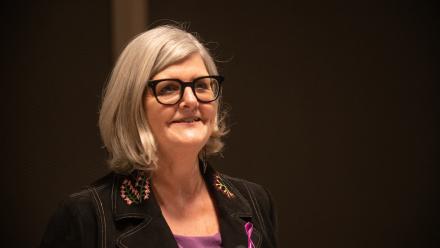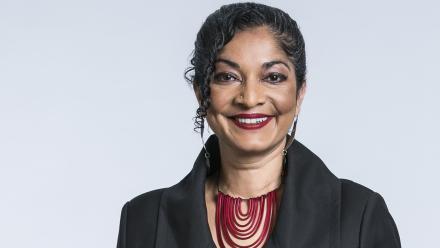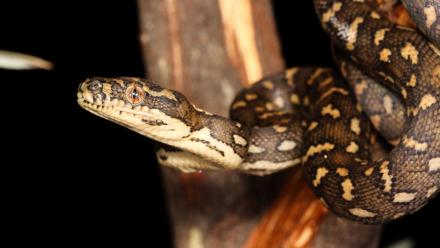Grades are not everything
Frank Gafa (BA '15)
02 Dec 2022
For me, going to ANU was about much more than getting good marks. It helped me expand my networks by meeting people I wouldn't otherwise have met.
I came to learn about the Australian National University (ANU) through Peter Radoll. He was the director of the Tjabal Indigenous Higher Education Centre at ANU and was doing an outreach program at schools. He came to my high school twice and talked about ANU and what they were doing. He was very inspiring.
My mum is an Aboriginal woman and she went to uni herself. Although she wanted me to go to the same uni as her and be closer to home, I chose ANU in Canberra because I saw it as an opportunity to be closer to the world of politics.
As a member of the Stolen Generations, our families and Indigenous people in general have many experiences living under unjust Government policy. This is the reason why I was interested in politics and activism. Within my first year at ANU, I became Indigenous Officer for the Student Association and held that voluntary role for three years. It led to my first paid job for ANU at the National Centre for Indigenous Studies, which was part of the law school at the time.
My current work is as University Partnership Manager at CSIRO. An experience at ANU that prepared me for this was through Ms Mary Porter AM. As a former member of the Legislative Assembly, Mary created an indigenous cadetship role within the ACT Legislative Assembly. I was the first person to hold that indigenous cadetship position and it was really fantastic.
Going to ANU and being in Canberra turned out to be extremely beneficial. There are all these events happening and ANU gets invited. So if you're willing to network, there are a lot of good opportunities. Just having access to that benefited me a lot.
For example, I spoke at an event for the Tjabal centre. Professor Mick Dodson-an idol of mine-saw me speaking and later in the night invited me to come have a drink with him. And so we sat there having a glass of wine. And after just one glass of wine with Mick, he gave me his card and asked me to send through my resume. A couple weeks later, I was working with him just doing basic administration. Seeing how he worked was so insightful and I made invaluable connections.
There were many opportunities like that through the Tjabal Centre and through ANU which prepared me for the work I do today, like the No Police at Pride campaign.
When I left ANU to work at Deakin University, some people back at ANU set up the Indigenous Alumni Network and invited me to chair the network. So, I've chaired it since 2016 and I've made an impact through that.
I feel I can continue to make a contribution to ANU because, as alumni, we're the ones who have actually experienced the university so it's important we have a say in how things are done. One way in which this is happening is that alumni now have a seat on the Reconciliation Action Plan Committee and are making a difference. And another advantage to having alumni involved in the university is that we can freely give opinions in a way that current students and staff might not be able to.
My advice to students might be a little controversial but here goes. Firstly, if you're choosing to study at the ANU, don't just focus on the academics. From a career perspective, taking advantage of all the events and the people that you are surrounded by in Canberra and ANU is invaluable. For me it was listening and learning from all the political and policy leaders coming to ANU that helped me get where I am today.
I also have advice specifically for Aboriginal and Torres Strait Islander students. You might find that there's a lot of pressure to "be everything" at university. For example, when Indigenous topics come up in class or in tutorials and you're the only Black student, people expect you to be the fountain of knowledge or to answer all the questions or to have an opinion. I would say feel free to push back. You'll make friends by standing up for yourself.
From a graduate point of view, there are a lot of graduate programs and a lot of graduate jobs floating around. And there's undue pressure to get into one of these jobs or programs straight after graduating. But the whole point of getting a degree is to widen your knowledge, to learn skills around research and critical thinking, to expand networks, and meet people who you wouldn't meet in communities where you grew up. So have a long hard think about what you actually want to do with your degree, and which graduate opportunity is right for you.
Don't feel you have to stay in a particular job or career path because that's what you've dreamt about or have been working towards. For instance, when I left ANU, I got a job at Deakin and I looked after their Indigenous employment program. I was an employment consultant and that was a dream job for me. After doing it for two years, I decided I wanted to contribute to the sector in a different way.
So I actually made the decision to make a major change career wise and became a union organiser for the NTEU for the next four years, and now I work as the University Partnerships Manager at the CSIRO. I realised that these roles working with Universities from the outside are better suited for me and my goal of helping make the university experience more valuable.
Other stories you might like to read
Page Owner:
Alumni


